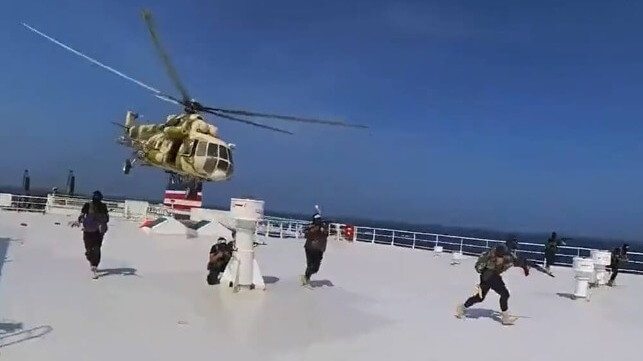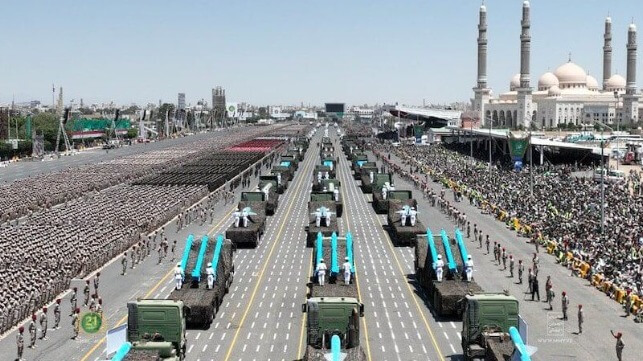Galaxy Leader's Crewmembers Mark One Year in Houthi Captivity
The rebel group continues to mount attacks on shipping, including another attempted strike on Sunday

This week, the crew of the hijacked car carrier Galaxy Leader mark one full year in Houthi captivity near the port of Hodeidah, Yemen.
The Galaxy Leader has been held in Houthi custody since the group's commando forces boarded and seized it on November 19, 2023. The Houthis boarded the vessel using a helicopter and quickly seized control of the bridge. It was the group's first high-profile attack on shipping after the start of the war in Gaza, and it presaged countless attacks to follow.
As motivation for the hijacking, the Houthis cited the Israeli-linked ownership interests of the ship's commercial operator, UK-based Ray Car Carriers. The militants diverted the vessel to Hodeidah, Yemen and opened it to the public, making it a popular tourist attraction and dance-hall destination.
It appears that the crew have been living aboard Galaxy Leader throughout their ordeal. Seventeen of the crewmembers are from the Philippines, and Manila has repeatedly called for their release. The remainder of the crew includes three Ukrainians, two Bulgarians, two Mexicans and one Romanian, reflecting the global nature of shipping and crewing.
In August, the Philippines Department of Foreign Affairs reported that several of the Filipino crewmembers were experiencing "significant health issues," including symptoms of malaria - a potentially fatal illness if untreated.
"It seems incredible that a year has passed, and the crew of the Galaxy Leader are still being held hostage. Innocent seafarers and families who have had their lives irrevocably changed by geopolitical forces wholly out of their control," said International Chamber of Shipping Secretary General Guy Platten. "The seafarers, some of whom have been at sea for nearly two years, have been held against their will only limited contact with their families, friends, and loved ones. This is unconscionable and must not be allowed to endure. We are thinking of the seafarers and all of those affected at this time, and we continue to call for humanity to prevail and their immediate release."
Since the hijacking of Galaxy Leader, Houthi forces have attacked more than 100 vessels with drones and missiles, sinking two ships, damaging countless others, and killing four seafarers. The rebel group's latest attack occurred Sunday night, when a vessel transiting off Mocha reported a near-miss missile splashdown, according to the Royal Navy's UK Maritime Trade Operations (UKMTO). No damage or injuries were reported, and the vessel continued on its commercial voyage.
FREE THE GALAXY LEADER CREW
On First Anniversary of Red Sea Crisis, U.S. Warns of Russian Involvement

On the first anniversary of the start of the Red Sea crisis, the UN Security Council called on the group to release the hijacked car carrier Galaxy Leader and the 25 crewmembers that the group has held hostage since 2023.
The Galaxy Leader has been in Houthi custody since November 19, 2023, when the group's commandos boarded the vessel using a helicopter and quickly seized control of the bridge. It was the group's first and last hijacking, but it was a harbinger of countless kinetic attacks that followed. Houthi forces have since struck at more than 100 vessels using drones and missiles, sinking two ships, damaging countless others, and killing four seafarers.
In a statement, the Security Council called for the Houthis to cease their campaign of attacks on merchant shipping, and emphasized that the UN arms embargo on Yemen could be an important tool in reducing threats to maritime security if enforced. The council's members called for continued international involvement in stabilizing regional security.
According to the U.S. government, Russia is becoming more closely involved in the Red Sea security situation, but not for purposes of stability. US Special Envoy for Yemen Tim Lenderking told Business Insider that Russia is talking with the Houthis about providing them with support, and he said that there is "a fairly serious level of engagement happening."
"We are particularly concerned about the kind of equipment that would really enable the Houthis to be more accurate in their targeting of US and other ships in the region," Lenderking said. "The fact that the Russians might assist in this effort is diabolical."
According to Reuters, Houthi officials likely met with Russian representatives in Iranian-brokered talks twice already this year. The group already receives extensive assistance from Iran, including both missile hardware and targeting intelligence.
Houthi forces may have found a way to earn money from their blockade by charging a "safe-transit" fee for Red Sea traffic, according to a recent panel of experts report compiled for the Security Council. The panel's evidence suggests that the Houthis’ earnings from these safe-transit fees could be "about $180 million per month" - a source of revenue that the group might be loathe to give up if it ceased its attacks. A spokesperson for the terrorist group recently told Lloyds' List that this fee system does not exist, and that the report was false.
No comments:
Post a Comment